
Systèmes d'exploitation. Logiciels. Linux and GNU. Why Open Source Misses the Point of Free Software. By Richard Stallman When we call software “free,” we mean that it respects the users' essential freedoms: the freedom to run it, to study and change it, and to redistribute copies with or without changes.
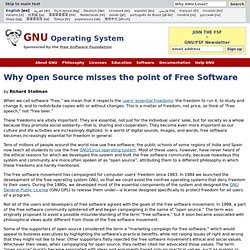
This is a matter of freedom, not price, so think of “free speech,” not “free beer.” These freedoms are vitally important. They are essential, not just for the individual users' sake, but for society as a whole because they promote social solidarity—that is, sharing and cooperation. Linus Torvalds: I will not change Linux to “deep-throat Microsoft” The Linux kernel development process may welcome all those who love open source software and have the right coding chops, but one man remains the ultimate authority on what does and doesn't go into Linux—and he isn't afraid to let everyone know it.
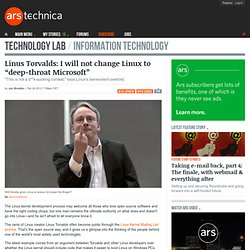
The rants of Linux creator Linus Torvalds often become public through the Linux Kernel Mailing List archive. That's the open source way, and it gives us a glimpse into the thinking of the people behind one of the world's most widely used technologies. The latest example comes from an argument between Torvalds and other Linux developers over whether the Linux kernel should include code that makes it easier to boot Linux on Windows PCs. This goes back to Microsoft requiring that PCs designed to run Windows 8 use UEFI firmware with the Secure Boot feature enabled. The Legacy of Linus Torvalds: Linux, Git, and One Giant Flamethrower.
Linus Torvalds.
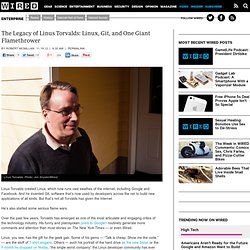
Photo: Jon Snyder/Wired Linus Torvalds created Linux, which now runs vast swathes of the internet, including Google and Facebook. And he invented Git, software that’s now used by developers across the net to build new applications of all kinds. But that’s not all Torvalds has given the internet. He’s also started some serious flame wars. Over the past few years, Torvalds has emerged as one of the most articulate and engaging critics of the technology industry. What is Copyleft? Copyleft is a general method for making a program (or other work) free, and requiring all modified and extended versions of the program to be free as well.
The simplest way to make a program free software is to put it in the public domain, uncopyrighted. This allows people to share the program and their improvements, if they are so minded. But it also allows uncooperative people to convert the program into proprietary software. They can make changes, many or few, and distribute the result as a proprietary product. Creative Commons : Soyons créatifs ensemble - Free Culture. La photo est issue du concert donnée à New-York le 21 septembre 2004 au bénéfice des licences Creative Commons (avec en particulier David Byrne et Gilberto Gil).

Elle est l’oeuvre de Kathryn et est sous licence cc (by-nc-sa). Nota (27 mai 2004) : petite mise à Jour de l’article pour tenir compte des nouvelles fonctionnalités des licences Creative Commons avec la sortie de la version 2.0. Quand on parle de licences libres, on fait souvent et inconsciemment référence aux libertés des utilisateurs : liberté de télécharger sur internet, d’utiliser et de distribuer autant de copies que l’on souhaite d’un logiciel X ou Y, de modifier le code d’un programme, etc. Mais qu’en est-il des libertés des auteurs ?
Se réduiraient-elles à la simple possibilité de diffuser leur travail pour que d’autres puissent en disposer (presque) comme bon leur semble ?! The GNU Manifesto. The GNU Manifesto (which appears below) was written by Richard Stallman in 1985 to ask for support in developing the GNU operating system.
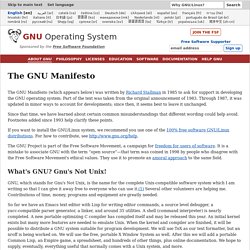
Part of the text was taken from the original announcement of 1983. Through 1987, it was updated in minor ways to account for developments; since then, it seems best to leave it unchanged. Since that time, we have learned about certain common misunderstandings that different wording could help avoid. Footnotes added since 1993 help clarify these points. Free software is a matter of liberty, not price. As our society grows more dependent on computers, the software we run is of critical importance to securing the future of a free society.
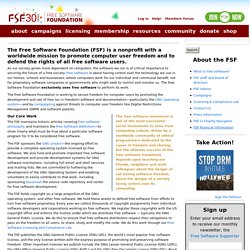
Free software is about having control over the technology we use in our homes, schools and businesses, where computers work for our individual and communal benefit, not for proprietary software companies or governments who might seek to restrict and monitor us. The Free Software Foundation exclusively uses free software to perform its work. The Free Software Foundation is working to secure freedom for computer users by promoting the development and use of free (as in freedom) software and documentation—particularly the GNU operating system—and by campaigning against threats to computer user freedom like Digital Restrictions Management (DRM) and software patents. A Quick Guide to GPLv3. By Brett Smith [This article is also available in PDF and reStructuredText formats.]
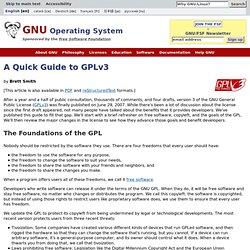
After a year and a half of public consultation, thousands of comments, and four drafts, version 3 of the GNU General Public License (GPLv3) was finally published on June 29, 2007. While there's been a lot of discussion about the license since the first draft appeared, not many people have talked about the benefits that it provides developers. We've published this guide to fill that gap. We'll start with a brief refresher on free software, copyleft, and the goals of the GPL.